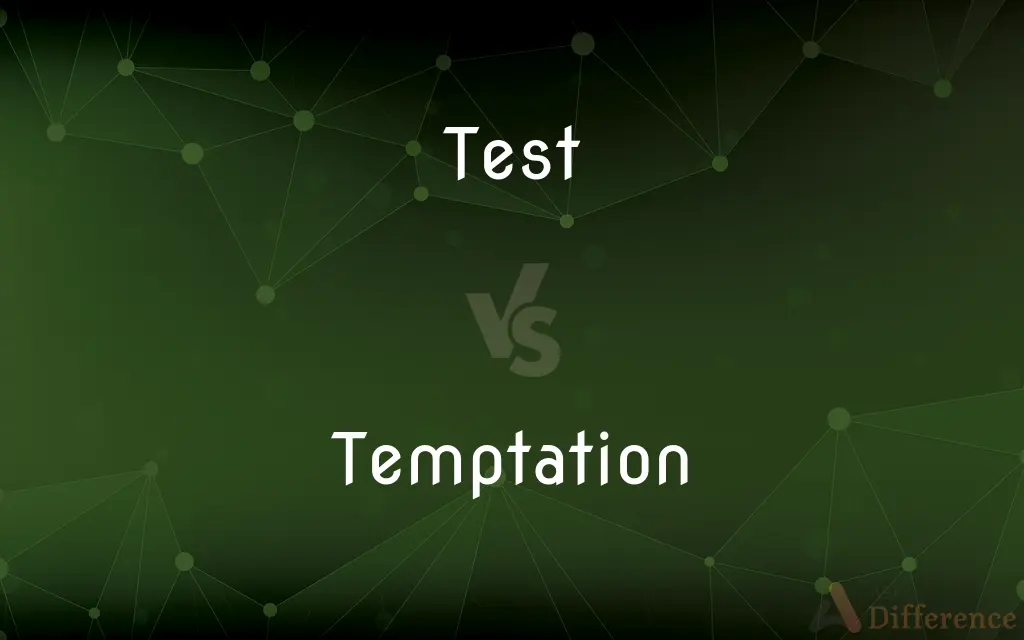Test vs. Temptation — What's the Difference?
By Urooj Arif & Fiza Rafique — Published on March 31, 2024
A test evaluates knowledge, ability, or performance, often under controlled conditions, while temptation is an enticement or inclination to engage in short-term pleasures or behaviors that may be harmful in the long run.

Difference Between Test and Temptation
Table of Contents
ADVERTISEMENT
Key Differences
A test is a structured assessment designed to measure skills, knowledge, abilities, or performance. It can occur in academic, professional, or personal contexts and typically has clear criteria and objectives. On the other hand, temptation involves a desire or urge to do something, particularly something enjoyable but potentially wrong or unwise. It is often associated with immediate gratification and can lead to ethical, moral, or practical dilemmas.
While tests are deliberately created and administered to assess and provoke thought, understanding, or skill development, temptations arise naturally or from external factors and appeal to desires or impulses. The purpose of a test is to challenge in a way that promotes growth, learning, or advancement, whereas temptation challenges self-discipline and often has the potential to detract from personal goals or values.
In the realm of education and professional development, tests are essential tools for determining progress, competency, and readiness for further challenges. In contrast, temptation plays a more significant role in personal and ethical development, testing an individual's resolve and ability to make decisions aligned with their long-term well-being and values.
The outcomes of tests are generally quantifiable and lead to tangible results or feedback, such as scores, grades, or certifications. The consequences of yielding to temptation, however, are more varied and can include personal regret, loss of trust, or long-term negative impacts on one’s health, relationships, or career.
Understanding the distinction between tests and temptations is crucial in various aspects of life. Recognizing a situation as a test can prepare an individual to use their skills and knowledge effectively, while identifying temptations can alert them to the need for self-control and careful decision-making to avoid negative outcomes.
ADVERTISEMENT
Comparison Chart
Definition
An assessment of knowledge, skills, or abilities.
An urge to engage in short-term pleasures or unwise behaviors.
Purpose
To evaluate, measure, and promote growth or advancement.
To entice or incline towards certain actions or choices.
Nature
Structured and objective.
Unstructured and subjective.
Outcome
Quantifiable results (scores, grades, certifications).
Personal or ethical consequences.
Role in Personal Development
Enhances knowledge, skills, and qualifications.
Tests self-control and long-term decision-making.
Compare with Definitions
Test
An examination to assess a person's knowledge or proficiency.
She studied hard for the math test to ensure a good grade.
Temptation
The desire to do something, especially something wrong or unwise.
He faced the temptation to cheat on the exam but ultimately decided against it.
Test
Used in various contexts to evaluate skills or abilities.
The driving test assesses an individual's ability to safely operate a vehicle.
Temptation
Can arise from various sources, including internal desires or external pressures.
The temptation to skip the gym was strong after a long day at work.
Test
Often has specific criteria and a clear objective.
The test for certification required a thorough understanding of the subject matter.
Temptation
Often involves a conflict between short-term pleasure and long-term goals.
Despite the temptation to splurge on a luxury item, she saved her money for future needs.
Test
Results are usually measurable and provide feedback.
His test results showed significant improvement in language skills.
Temptation
The consequences of giving in to temptation can vary widely.
Succumbing to the temptation of fast food had negative effects on her health.
Test
Can be formal or informal, depending on the setting.
The software trial was a test of the new program's user-friendliness.
Temptation
Can test an individual's self-control and ethical values.
Resisting the temptation to lie in the report was a true test of his integrity.
Test
A procedure for critical evaluation; a means of determining the presence, quality, or truth of something; a trial
A test of one's eyesight.
Subjecting a hypothesis to a test.
A test of an athlete's endurance.
Temptation
The act of tempting or the condition of being tempted.
Test
A series of questions, problems, or physical responses designed to determine knowledge, intelligence, or ability.
Temptation
Something tempting or enticing.
Test
A basis for evaluation or judgment
"A test of democratic government is how Congress and the president work together" (Haynes Johnson).
Temptation
The act of tempting.
Test
To put to the proof; to prove the truth, genuineness, or quality of by experiment, or by some principle or standard; to try.
To test the soundness of a principle
To test the validity of an argument
Temptation
Pressure applied to one's thinking designed to create wrong emotions which will eventually lead to wrong actions.
Test
To examine or try, as by the use of some reagent; as, to test a solution by litmus paper.
Temptation
The desire to have or do something that you know you should avoid;
He felt the temptation and his will power weakened
Test
To administer a test to (someone) for the purpose of ascertaining a person's knowledge or skill; especially, in academic settings, to determine how well a student has learned the subject matter of a course of instruction.
Temptation
The act of influencing by exciting hope or desire;
His enticements were shameless
Test
Trying something to find out about it;
A sample for ten days free trial
A trial of progesterone failed to relieve the pain
Test
Undergo a test;
She doesn't test well
Common Curiosities
How can temptation impact personal development?
Yielding to temptation can hinder personal growth by detracting from long-term goals, but resisting temptation can strengthen self-discipline and ethical decision-making.
What is the main purpose of a test?
To assess and measure knowledge, skills, or abilities for the purpose of growth, learning, or certification.
What strategies can help resist temptation?
Setting clear goals, practicing self-discipline, seeking support, and avoiding triggering situations can help resist temptation.
Are tests only academic in nature?
No, tests can also be professional, personal, or practical, assessing a wide range of skills and competencies.
How do outcomes of tests and temptations differ?
Test outcomes are usually quantifiable and lead to tangible results, while the consequences of temptations are more subjective and can affect personal or ethical integrity.
Can temptation be positive?
While temptation is typically viewed negatively, the process of overcoming temptation can lead to personal growth and stronger self-control.
Is a temptation always related to doing something wrong?
Not necessarily; temptation can involve anything that diverts from one's goals or values, not just morally wrong actions.
Can tests include elements of temptation?
Yes, tests can present situations where individuals might be tempted to take shortcuts or unethical actions to achieve desired outcomes.
How can one prepare for a test?
Through study, practice, and review of relevant material or skills.
Are there tests designed to assess one's susceptibility to temptation?
Yes, psychological tests and assessments can evaluate traits like impulsivity and self-control, which relate to susceptibility to temptation.
How can failing a test or succumbing to temptation lead to growth?
Both can provide valuable lessons, highlighting areas for improvement and strengthening resolve for future challenges.
Do all tests have standardized criteria?
Many do, especially in academic and professional settings, but informal tests might have more flexible or subjective criteria.
Is professional help available for dealing with tests or temptations?
Yes, educators, tutors, and therapists can provide strategies and support for academic tests and personal temptations, respectively.
Can the concept of temptation apply to organizations or groups?
Yes, organizations or groups may face temptations that challenge their ethics, goals, or cohesion, requiring collective discipline and integrity.
Can overcoming temptation be considered a test?
In a broader sense, yes, as it assesses an individual's ability to uphold their values and long-term goals in the face of short-term desires.
Share Your Discovery

Previous Comparison
Calcium Carbonate vs. Calcium Citrate
Next Comparison
Acetone vs. Isopropyl AlcoholAuthor Spotlight
Written by
Urooj ArifUrooj is a skilled content writer at Ask Difference, known for her exceptional ability to simplify complex topics into engaging and informative content. With a passion for research and a flair for clear, concise writing, she consistently delivers articles that resonate with our diverse audience.
Co-written by
Fiza RafiqueFiza Rafique is a skilled content writer at AskDifference.com, where she meticulously refines and enhances written pieces. Drawing from her vast editorial expertise, Fiza ensures clarity, accuracy, and precision in every article. Passionate about language, she continually seeks to elevate the quality of content for readers worldwide.
















































